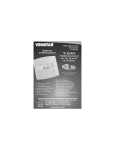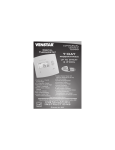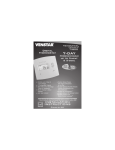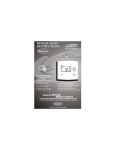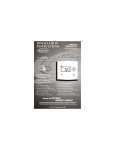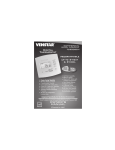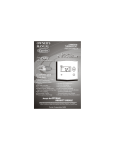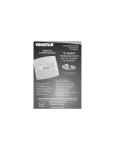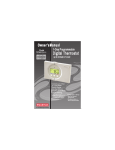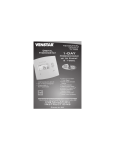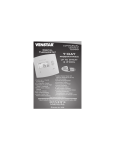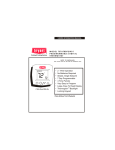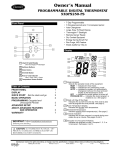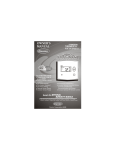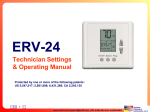Download Carrier 33CS420-01 Owner`s manual
Transcript
INSTALLATION INSTRUCTIONS P/N 33CS420-01 DIGITAL IGITAL THERMOSTAT 7-DAY PROGRAMMABLE & HEAT COOL COMMERCIAL THERMOSTAT I2:00 HEAT PUMP Pm Su 74 COOL AUTO 72 HEAT 3 Configurable Outputs Control up to 3 Heat & 2 Cool Stages Adjustable 2nd & 3rd Stage Timers & Deadbands Backlit Display & Button Legends Aux Heat Indicator Set Point Limiting Outdoor Sensor Ready with High/Low Readouts for the Day Accepts EZ Programmer Accepts Optional Humidity Module: Controls Humidification, Dehumidification and Reheat Accepts Optional IR Remote Control Accepts the OPTIONAL HUMIDITY MODULE Use with most Air Conditioning & Heating Systems including: 1 or 2 Stage Electric Cooling & 3 Stage Gas Heating, Heat Pump, Electric or Hydronic Heat. Carrier Corporation 04/06 Carrier CAUTION Follow the Installation Instructions before proceeding. Set the thermostat mode to “OFF” prior to changing settings in setup or restoring Factory Defaults. CAUTION NEVER PUT MORE THAN ONE JUMPER ON THE SAME MISC JUMPER BLOCK! THIS MAY DAMAGE YOUR THERMOSTAT. MISC3 MISC3 OK NOTE: Due to variations in environmental conditions, it is not always possible to achieve the desired humidification or dehumidification setpoint. This device complies with Part 15 of the FCC Rules. Operation is subject to the following two conditions: (1) this device may not cause harmful interference, and (2) this device must accept any interference received, including interference that may cause undesired operation. Thermostat 33CS420-01 c FC Tested to Comply with FCC Standards 4Z95 FOR HOME OR OFFICE USE Page i Table of Contents Carrier Preparation Remove & Replace the Old Thermostat Configuring the MISC Outputs Wire Connections Sample Wiring Diagrams Test Operation Calibrating the Thermostat Sensors TroubleShooting Page iii 1 2 3 4 5 6 7 8 SECTION 1 Preparation Carrier 1 Proper installation of the thermostat will be accomplished by following these step by step instructions. If you are unsure about any of these steps, call a qualified technician for assistance. Assemble tools Flat Blade Screwdriver Wire cutter & Stripper Make sure your Heater/Air Conditioner is working properly before beginning installation of the thermostat. Carefully unpack the thermostat. Save the screws, bracket, and instructions. Turn off the power to the Heating/Air Conditioning system at the main fuse panel. Most residential systems have a separate breaker for disconnecting power to the furnace. Page 1.1 SECTION 2 Remove & Replace the Old Thermostat Carrier Remove the cover of the old thermostat. If it does not come off easily check for screws. 2 Loosen the screws holding the thermostat base or subbase to the wall, and lift away. Disconnect the wires from the old thermostat. Tape the ends of the wires as you disconnect them, and mark them with the letter of the terminal for easy reconnection to the new thermostat. Keep the old thermostat for reference purposes until your new thermostat is functioning properly. Page 2.1 SECTION 3 Configuring the MISC Outputs Carrier 3 Section 3 Contents: Configuring the Jumpers........3.2 Explanation of Jumper Settings..................................3.3 Page 3.1 Carrier Configuring the Jumpers For additional flexibility, your thermostat has three configurable 3 outputs. These outputs are designed to have different functions depending on how the jumpers are set (below). Each output, labeled MISC1, MISC2, and MISC3 may be set for one of the four choices available. In the diagram below, the MISC3 jumper has been set for HUM* (humidification) operation, the MISC2 jumper has been set for DEHUM* (dehumidification) operation, and the MISC1 jumper has been set for Y2 (second stage cooling) operation. GAS W3 (FAN) ELEC W3 HP GAS HUM DEHUM MISC3 MISC2 MISC1 Y2 B (MISC1 ONLY) O W1 HUM HUM G NO HUM W2 Y1 MISC1 RS2 MISC2 DEHUM MISC3 Y2 Z 8 4 6 2 MISC3 RSGND MISC2 Y 1 7 3 9 INSTALL HUMIDITY MODULE WITH SENSING ELEMENT OUTWARD 5 C 1 X RS+5 R MISC1 (MISC1 ONLY) *The Humidity Module (sold separately) must be installed to operate a humidification and/or dehumidification system. CAUTION NEVER PUT MORE THAN ONE JUMPER ON THE SAME MISC JUMPER BLOCK! DOING SO MAY DAMAGE YOUR THERMOSTAT AND VOID THE WARRANTY. MISC3 OK Page 3.2 MISC3 Carrier Explanation of Jumper Settings JUMPER SETTING 3 W3 If the jumper for MISC1, MISC2, or MISC3 is set to W3, the corresponding MISC screw terminal on the backplate will control a third stage of heat. W3 MULTI-STAGE OPERATION EXPLAINED - SECTION 13 of the Owner’s Manual The 3rd Stage of Heat is turned on when: (A) The 1st and 2nd stages have been on for the time required (steps 23 and 24, page 13.6). It is adjustable from 0-60 minutes and the default And is two minutes. (B) The temperature from the setpoint is equal to or greater than: the setpoint plus the 1st stage deadband (step #20, 13.5), plus the 2nd stage deadband (step #21, 13.5) plus the 3rd stage deadband (step #22, 13.5). This 3rd stage deadband is adjustable from 0-10 degrees and the default is two degrees. Cooling Heating 3rd Stage turn on Deadband Deadband Deadband Deadband Deadband db 3 (adj. 0-10 ) db 2 (adj. 0-10 ) db 1 (adj. 1-6 ) db 1 (adj. 1-6 ) db 2 (adj. 0-10 ) 2nd Stage turn on 1st Stage turn on DECREASE Heat Setpoint Cool Setpoint TEMPERATURE 1st Stage turn on 2nd Stage turn on INCREASE HUM JUMPER SETTING If the jumper for MISC1, MISC2, or MISC3 is set to HUM, the corresponding MISC screw terminal on the backplate will control a humidification system. HUMIDIFICATION OPERATION - SECTION 9 of the Owner’s Manual If your HVAC unit is equipped with a humidification system and the Humidity Module (sold separately) has been installed, the thermostat will provide power to the MISC1, MISC2, or MISC3 terminal of the thermostat when the humidity in the home falls below the humidity setpoint you have chosen. The value for this setpoint ranges from 0% to 60%. If no humidity is desired or if a humidification system has not been installed, set the value to OFF. Page 3.3 Carrier Explanation of Jumper Settings (continued) DEHUM JUMPER SETTING If the jumper for MISC1, MISC2, or MISC3 is set to DEHUM, the corresponding MISC screw terminal on the backplate will be connected to the dehumidification terminal of a furnace board. NOTE: Not all furnaces have a dehumidification terminal. 3 DEHUMIDIFICATION OPERATION - SECTION 10 of the Owner’s Manual If your HVAC unit is equipped with a dehumidification system the thermostat will operate in one of two ways. 1) Normally Closed (NC): The thermostat will de-energize the MISC1, MISC2, or MISC3 terminal of the thermostat (this MISC terminal is connected to the DEHUM terminal on your furnace) to allow the fan to run in low speed when the humidity in the home is above the dehumidify setpoint you have chosen and there is a call for 1st stage cooling. 2) Normally Open (NO): The thermostat will energize the MISC1, MISC2, or MISC3 terminal of the thermostat (this MISC terminal is connected to the DEHUM terminal on your furnace) to allow the fan to run in low speed when the humidity in the home is above the dehumidify setpoint you have chosen and there is a call for 1st stage cooling. Page 3.4 Carrier Explanation of Jumper Settings (continued) 3 Y2 JUMPER SETTING If the jumper for MISC1 is set to Y2 the MISC1 screw terminal on the backplate will control a second stage of cooling. Y2 OPERATION - SECTION 13 of the Owner’s Manual Control up to two Cool stages. The 2nd Stage of heat or cool is turned on when: (A) The 1st Stage has been on for the time required (step #23, page 13.6). It is adjustable from 0-60 minutes and the default is two minutes. And (B) The temperature spread from the setpoint is equal to or greater than: the setpoint plus the deadband (step #24, page 13.6), plus the 2nd deadband (step #21, page 13.5). This 2nd deadband is adjustable from 0-10 degrees and the default is two degrees. Cooling Deadband Deadband db 1 (adj. 1-6 ) db 2 (adj. 0-10 ) 1st Stage turn on Cool Setpoint TEMPERATURE INCREASE Page 3.5 2nd Stage turn on SECTION 4 Wire Connections Carrier If the terminal designations on your old thermostat do not match those on the new thermostat, refer to the chart below, or the wiring diagrams 4 that follow. Wire from the old thermostat terminal marked Function Install on the new thermostat connector marked G or F Fan G Y1, Y or C Cooling Y1 W1, W or H Heating W1/O/B Rh, R, M, Vr, A Power R C Common C Rev. Valve W1/O/B* O/B W2 2nd Stage Heat W2 MISC1 Configurable Output #1 MISC1 MISC2 Configurable Output #2 MISC2 MISC3 Configurable Output #3 MISC3 RS+5 Outside Sensor +5vdc RS+5 RSGND Outside Sensor Ground RSGND RS2 Outside Sensor Signal #2 RS2 * O/B is used if your system is a Heat Pump. Page 4.1 SECTION 5 Sample Wiring Diagrams Carrier Section 5 Contents: 5 HVAC Equipment Wiring............5.2 MISC1, MISC2, and MISC3 Wiring........................................5.6 Installing the Outside Sensor...5.8 Page 5.1 Carrier 6 Wire, 1 Stage Cooling, 1 Stage Heat Residential & Commercial 1 Stage Cooling, with 1st Stage Gas Heat OR Commercial Heat Pump 1 Stage Cooling with 2 Stage Heat 5 W2 MISC1 RS2 MISC3 RS+5 W1/O/B Y1 G MISC2 R C RSGND GAS (FAN) ELEC HP ELEC GAS (FAN) GAS W3 HP GAS HUM DEHUM MISC3 MISC2 MISC1 Y2 B (MISC1 ONLY) O W1 G NO HUM W2 Y1 HUM B MISC2 MISC1 RS2 MISC3 O RS+5 R INSTALL HUMIDITY MODULE WITH SENSING ELEMENT OUTWARD 24 vac return R Fan relay G Compressor relay W2 W1 Y1 24 vac common C C 1st stage heat circuit 2nd stage heat circuit RSGND 6 Conductor 18 gauge unshielded cable from the thermostat to the equipment. Carrier 6 Wire, 1 Stage Cooling, 1 Stage Heat Residential & Commercial 1 Stage Cooling, with 1st Stage Electric Heat 5 W2 MISC1 RS2 MISC3 RS+5 W1/O/B Y1 G MISC2 R C RSGND GAS (FAN) ELEC HP ELEC GAS (FAN) GAS W3 HP GAS HUM DEHUM MISC3 MISC2 MISC1 Y2 B (MISC1 ONLY) O W1 W2 G HUM Y1 NO HUM B MISC2 O MISC1 RS2 MISC3 RS+5 R 24 vac return R Fan relay G Compressor relay W2 W1 Y1 24 vac common C C 1st stage heat circuit 2nd stage heat circuit INSTALL HUMIDITY MODULE WITH SENSING ELEMENT OUTWARD RSGND 6 Conductor 18 gauge unshielded cable from the thermostat to the equipment. Carrier 6 Wire, 1 Stage Cooling, 2 Stage Heat Residential Heat Pump with O Reversing Valve 1 Stage Cooling, with 2 Stage Heat 5 W2 MISC1 RS2 MISC3 RS+5 W1/O/B Y1 G MISC2 R C RSGND GAS (FAN) ELEC HP ELEC GAS (FAN) GAS W3 HP GAS HUM DEHUM MISC3 MISC2 MISC1 Y2 B (MISC1 ONLY) O W1 G NO HUM W2 Y1 HUM B MISC2 MISC1 RS2 MISC3 O RS+5 R INSTALL HUMIDITY MODULE WITH SENSING ELEMENT OUTWARD R Fan Relay Reversing Valve O 2nd stage heat circuit W2 Compressor Relay Y1 24 vac return G 24 vac common C C RSGND 6 Conductor 18 gauge unshielded cable from the thermostat to the equipment. Carrier 6 Wire, 1 Stage Cooling, 2 Stage Heat Residential Heat Pump with b Reversing Valve 1 Stage Cooling, with 2 Stage Heat 5 W2 MISC1 RS2 MISC3 RS+5 W1/O/B Y1 G MISC2 R C RSGND GAS (FAN) ELEC HP ELEC GAS (FAN) GAS W3 HP GAS HUM DEHUM MISC3 MISC2 MISC1 Y2 B (MISC1 ONLY) O W1 HUM G NO HUM W2 Y1 B MISC2 MISC1 RS2 MISC3 O RS+5 R R Fan Relay Reversing Valve b 2nd stage heat circuit W2 Compressor Relay Y1 24 vac return G 24 vac common C C INSTALL HUMIDITY MODULE WITH SENSING ELEMENT OUTWARD RSGND 6 Conductor 18 gauge unshielded cable from the thermostat to the equipment. Carrier Adding a 2nd Stage of Cooling (MISC1) and a 3rd Stage of Heating (MISC3) 5 W2 MISC1 RS2 MISC3 RS+5 W1/O/B Y1 G MISC2 R C RSGND W3 GAS (FAN) ELEC W3 HP GAS HUM DEHUM MISC3 MISC2 MISC1 Y2 B (MISC1 ONLY) O W1 W2 G HUM Y1 NO HUM HUM MISC2 DEHUM MISC1 RS2 MISC3 RS+5 R C Y2 3rd Stage Heat 2nd Stage Cooling MISC2 MISC1 Y2 W3 MISC3 (MISC1 ONLY) Page 5.6 INSTALL HUMIDITY MODULE WITH SENSING ELEMENT OUTWARD RSGND Carrier Adding a Humidification System (MISC1) and Dehumidification System (MISC2)*. 5 W2 MISC1 RS2 MISC3 RS+5 W1/O/B Y1 G MISC2 R C RSGND W3 GAS HUM (FAN) ELEC W3 PROG HP NO HUM GAS HUM DEHUM MISC3 MISC2 MISC1 Y2 B (MISC1 ONLY) O W1 HUM Y1 G NO HUM HUM W2 MISC1 RS2 MISC2 DEHUM MISC3 Dehumidification System Humidification System * Requires Humidity Module. 2 4 8 1 X Z 9 Y 8 4 Z (Sold Separately) 6 1 7 3 5 9 Y Humidity Module 1 (MISC1 ONLY) 7 MISC1 RSGND 3 MISC2 INSTALL HUMIDITY MODULE WITH SENSING ELEMENT OUTWARD 5 MISC3 6 2 Y2 1 X RS+5 R C Carrier Installing the Outside Sensor One wired or wireless remote sensor may be installed to read the outside temperature (RS2). The wired sensor can be connected to the thermostat with up to 150’ of 18 ga., 300’ of 20 ga., or 450’ of 22 ga. unshielded, thermostat wire. The wired sensor can be connected to the thermostat using a two or three wire installation. 5 If a two wire installation is required, then RS+5 must be connected to RSGND (see below). This wire MUST be completely separated from the thermostat or any other control wiring and must NOT be in the same conduit as high voltage wiring. W2 MISC1 RS2 MISC3 RS+5 RS1 RSGND W1/O/B Y1 G MISC2 CK1 CKGND R C RS-GND RS RS Outside Sensor See the Outside Sensor accessory for further details. Page 5.8 SECTION 6 Test Operation Carrier Turn the power on to the Heating/Air Conditioning system. 6 Press the MODE button repeatedly until the HEAT icon appears on the display. Press the UP or DOWN buttons until the set temperature is 10 degrees above room temperature; the furnace should turn on. Press the MODE button repeatedly until the COOL icon appears on the display. Press the UP or DOWN buttons until the set temperature is 10 degrees below room temperature; the air conditioner should turn on. NOTE: Most equipment has a time delay of 5 minutes between cool cycles. This feature is defeatable on the thermostat. Consult the Owner's Manual under Setup, cycles per hour. Press the UP button until the setpoint is equal to the room temperature. Press the FAN button to Fan On. The fan should turn on and run continuously. Note: Due to the Random Start feature there will be a 2 to 30 second delay before heating or cooling may be energized. This delay helps to keep multiple thermostats from energizing their outputs at the same time after a power outage. Page 6.1 SECTION 7 Calibrating the Thermostat Sensors Carrier Under normal circumstances it will not be necessary to adjust the calibration of the temperature and humidity sensors. If calibration is required, please contact a trained HVAC technician to correctly perform the following procedure. I2:00 Su MODE MODE FAN Place the thermostat in the OFF mode. Press and hold the MODE button. While holding the MODE button, press and hold the FAN button for 5 seconds. All icons will appear on the display. OFF 72 88 I88 88 Pm 7 I8:88 Am Program On Setup Pm StartStop HI SuMoTuWeThFrSa DeHumidify Service Filter UV Light AUTO OFFON Unoccupied 123 Override FanOn COOL Outside AUXHEAT LO PRESS THERMOSTAT SENSOR Press the UP and DOWN buttons at the same time twice. The thermostat temperature will be displayed and may be calibrated using the UP or DOWN buttons. CALIBRATE TWICE HUMIDITY SENSOR MODE Press the MODE button once. The relative humidity at the thermostat will be displayed and may be calibrated using the UP or DOWN buttons. CALIBRATE After calibration is complete, press the MODE button to return to normal operation. Page 7.1 SECTION 8 TroubleShooting Carrier SYMPTOM: The air conditioning does not attempt to turn on. CAUSE: The compressor timer lockout may prevent the air conditioner from turning on, for a period of time. REMEDY: Consult the Owner's Manual in the Setup section to defeat the cycles per hour and compressor timeguard. 8 SYMPTOM: The display is blank. CAUSE: Lack of proper power. REMEDY: Make sure power is turned on to the furnace and that you have 24vac between R & W. If C is used, 24vac between R & C. SYMPTOM: The air conditioning does not attempt to turn on. CAUSE: The cooling setpoint is set too high. REMEDY: Consult the Owner's Manual in the Setup section to lower the cooling setpoint limit. SYMPTOM: The heating does not attempt to turn on. CAUSE: The heating setpoint is set too low. REMEDY: Consult the Owner's Manual in the Setup section to raise the heating setpoint limit. Note: Due to the Random Start feature there will be a 2 to 30 second delay before heating or cooling may be energized. This delay helps to keep multiple thermostats from energizing their outputs at the same time after a power outage. P/N 88-503 Page 8.1 Rev. 5























